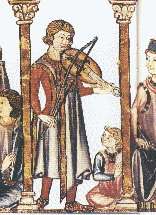Johannes de Grocheio
Johannes de Grocheio (or Grocheo) (Ecclesiastical Latin: [jɔˈan.nɛs dɛ ɡrɔˈkɛj.jɔ]; c. 1255 – c. 1320) was a Parisian musical theorist of the early fourteenth century. His French name was Jean de Grouchy, but he is more commonly known by his Latinized name. A Master of Arts, he is the author of the treatise Ars musicae ("The art of music") (c. 1300), an attempt to describe the music of his time as it was practiced in and around Paris.
He divides music into three categories:
- Musica simplex (popular music; music of the layperson)
- Composita (according to metrical rules; music of the educated person)
- Ecclesiastica (music of the Church)
Grocheio departed from Boethius' taxonomy, which divided music between music of the world, human music, and instrumental music.

Almost one-third of Grocheio's treatise is devoted to liturgical and composed music. The rest is devoted to secular music, and Grocheio surveyed its new social importance in a systematic and pedagogical fashion. Grocheio writes, for example, that "a good fiddler generally performs every kind of cantus and cantilena [cantilène], and every musical form."
Grocheio was also one of the first scholars to define a motet. He believed that the motet was "not intended for the vulgar who do not understand its finer points and derive no pleasure from hearing it: it is meant for educated people and those who look for refinement in art."
The purpose of music according to Grocheio's treatise
Grocheio attempted to address the sociological functions of specific musical forms and genres, and touted music as a cure for the ailments of society, imbuing it with the power to restrain social vices. He believed that when the elderly, the laborers, and the middle classes sang of the hardships endured by the heroes of the chansons de geste, it helped them to bear their miseries, thus contributing to the welfare of the state. Narrative epics, Grocheio concluded, contributed to the stability of the city because they encouraged citizens of all ages and stations to be satisfied with their lot in life.
Conversely, Grocheio believed that trouvère songs inspired kings and noblemen to do great things and to be great: "This kind of song is customarily composed by kings and nobles and sung in the presence of kings and princes of the land so that it may move their minds to boldness and fortitude, magnanimity and liberality…"
Manuscripts
- Darmstadt, Hessische Landes- und Hochschulbibliothek, MS 2663, ff. 56-59.
- London, British Library, Harley 281, ff. 30-52.
Editions and Translations
- Rohloff, Ernst, trans. Der Musiktraktat des Johannes de Grocheo nach den Quellen neu herausgegeben mit Übersetzung ins Deutsche und Revisionsbericht. Media latinitas musica 2, Gebrüder Reinecke, Leipzig 1943, p. 41-67.
- Say, Albert, trans. Johannes de Grocheo: Concerning Music (De musica). Colorado Springs College Music Press, translations (1), Colorado Springs 1973 (2nd. ed).
- Page, Christopher. "Johannes de Grocheio on secular music: a corrected text and a new translation.” Plainsong and Medieval Music 2, no. 1 (1993): 17-41.
- Johannes de Grocheio. Ars Musice, ed. and trans. Constant J. Mews, John N. Crossley, Catherine Jeffreys, Leigh McKinnon, and Carol J. Williams. Kalamazoo, MI: Medieval Institute Publications, 2011.
Notes
- ^ Christopher Page, "Listening to the trouvères," Early Music, Vol. 25, No. 4, November 1997.
External links
- (in English) Latin text of the Ars musicae
- (in French) Musicologie
- (in English) Abstract of John William Trout, The ars musicae of Johannes de Grocheio, University of Cincinnati, College-Conservatory of Music
- (in English) Patricia P. Norwood, book review for Christopher Page, The Owl and the Nightingale: Musical Life and Ideas in France, 1100-1300
- (in English) Waisted vielle
- (in English) Round dance history